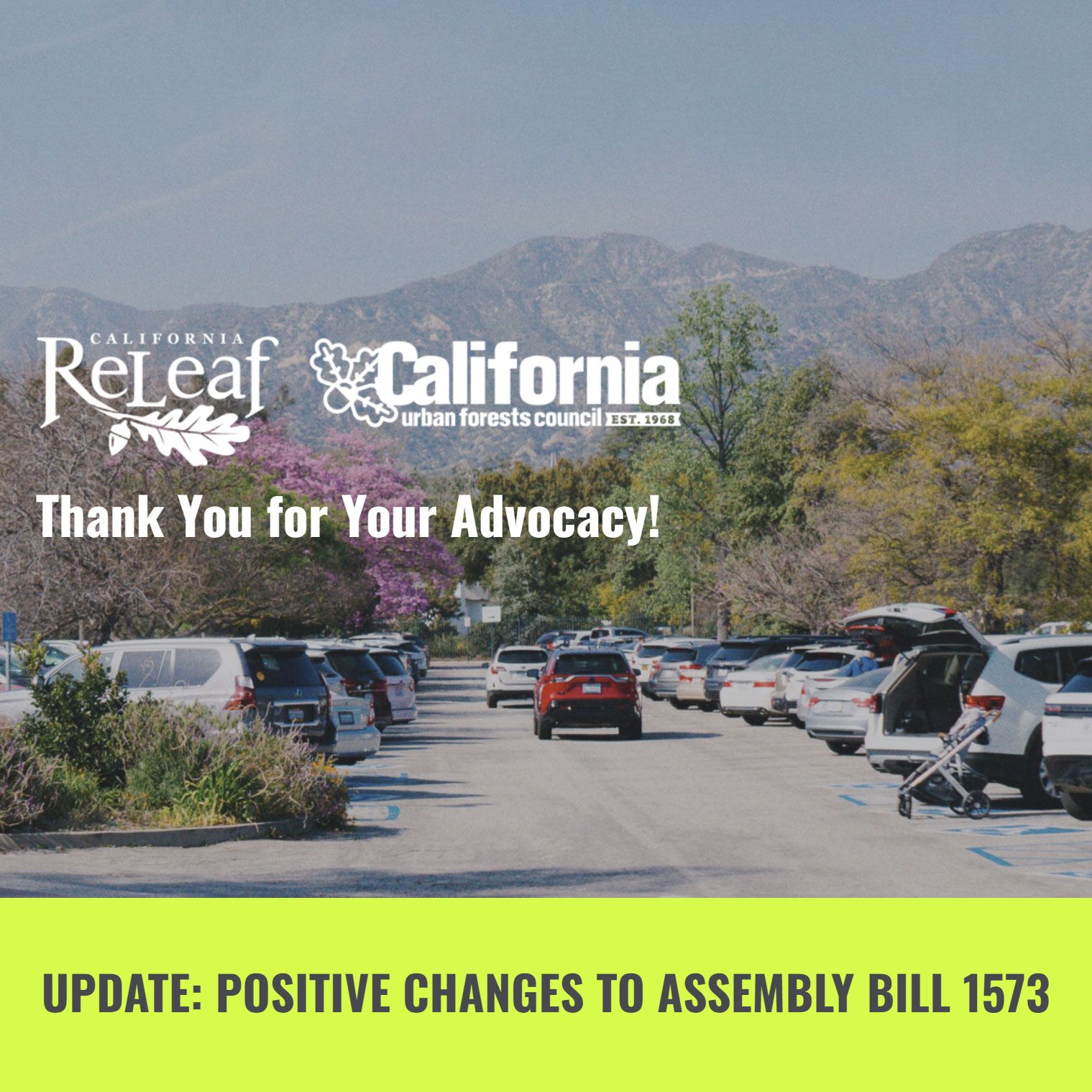UPDATE! As of August 17, 2023
Your outreach to the Senate Appropriations Committee has not gone un noticed – it has made a significant difference. Today, we are pleased to inform you that Assembly Bill 1573 has been amended. These amendments reflect a collaborative effort to find a balanced solution that respects both our urban environments and the preservation of our vital urban trees.
noticed – it has made a significant difference. Today, we are pleased to inform you that Assembly Bill 1573 has been amended. These amendments reflect a collaborative effort to find a balanced solution that respects both our urban environments and the preservation of our vital urban trees.
AMENDED BILL DETAILS:
You can review the amended bill here.
ONGOING MONITORING:
While we move forward, we will continue to monitor the progress of Assembly Bill 1573 closely. Your commitment to our urban forests is a driving force behind our advocacy, and we are honored to have you as part of our community.
A GRATEFUL SALUTE TO OUR URBAN FORESTS:
The trees of our urban forests extend their gratitude. As they grow and thrive, they will continue to mitigate the urban heat island effect and offer invaluable sustainability benefits to our communities. Your support has been an essential part of this positive outcome, and we thank you from the bottom of our hearts.
Once again, thank you for your unwavering dedication. Together, we are making a meaningful impact on the preservation and well-being of our urban forests.
___________________________________________________________________________________________________________________
Advocacy Alert – Original Post August 14, 2023
Assembly Bill 1573 would create California’s first requirement for native plants in public and commercial landscapes, with 25% for all nonresidential projects beginning in 2026 and climbing to 75% by 2035! You’ve read that right. And that includes trees.
Although well-intentioned, this bill has unintended negative consequences for urban forestry and addressing climate change. If we are to meet California’s climate goals, seriously restricting tree varieties in urbanized areas to a very limited number of native species will impact the overall sustainability of the urban forest.
THE CHALLENGE:
Urban trees are vital in combatting the urban heat island effect, enhancing air quality, and fostering community well-being. Guided by the principle of planting “the right tree in the right place for the right reason,” urban tree selection is a nuanced process that considers multiple factors. While there are situations when a native tree aligns perfectly with this principle, it’s essential to recognize that diversity of species within urban forests contributes to their overall health and resilience.
There will undoubtedly be instances when a native tree is indeed “the right tree in the right place for the right reason,” and in those cases, we fully support its use. However, the one-size-fits-all approach mandated by Assembly Bill 1573 could potentially overlook the importance of this principle, limiting the flexibility needed for optimal tree selection in specific urban contexts.
BALANCING CONSERVATION AND URBAN SUSTAINABILITY:
Our commitment to conserving native plants and protecting pollinators is unwavering. Nevertheless, we must consider the intricacies of urban ecosystems. The bill’s potential to limit tree diversity in urban forests could inadvertently weaken their resilience in the face of changing climate conditions.
OUR ADVOCACY:
We strongly advocate for the exemption of urban trees from Assembly Bill 1573. By doing so, we seek a balanced approach that respects the unique challenges of urban environments.
The bill has passed the Assembly and the Senate Natural Resources Committee. It’s now headed to its final hearing with the Senate Appropriations Committee on August 21.
TAKE ACTION:
Your voice can drive change. Join us in urging the Senators on the Senate Appropriations Committee to exempt urban trees from Assembly Bill 1573. Make your voice heard through emails and calls, expressing concerns about the potential unintended consequences on our urban trees. Together, we can ensure a sustainable and vibrant future for California’s urban landscapes.
Contact the Senators on the Appropriations Committee:
Senator Anthony J. Portantino
District 25 (916) 651-4025
senator.portantino@senate.ca.gov
Senator Brian Jones District 40
(916) 651-4040
senator.jones@senate.ca.gov
Senator Angelique Ashby District 8
(916) 651-4008
senator.ashby@senate.ca.gov
Senator Steven Bradford District 35
(916) 651-4035
senator.bradford@senate.ca.gov
Senator Kelly Seyarto District 32
(916) 651-4032
senator.seyarto@senate.ca.gov
Senator Aisha Wahab District 10
(916) 651-4410
senator.wahab@senate.ca.gov
Senator Scott Wiener District 11
(916) 651-4011
senator.wiener@senate.ca.gov
Senator Toni Atkins District 39
(916) 651-4039
senator.atkins@senate.ca.gov
ADDITIONAL RESOURCES:
- Link to email all senators together
- AB1573-SampleEmail (Word .docx file)
- California Urban Forest Inventory
- Study on Native Trees and Wildlife
- Native to Where? California’s Native Trees and Their Use in the Urban Environment (Pawlak, Love, Yost, Fricker & Ritter)
- Diversity and Structure in California’s urban forest: What over six million data points tell us about one of the world’s largest urban forests (Love, Nguyen, Pawlak, Pineda, Reimer, Yost, Fricker, Ventura, Doremus, Crow & Ritter)
- AB-1573 Water conservation: landscape design: model ordinance
- California Urban Forests Council Advocacy Page
THANK YOU:
We extend our heartfelt gratitude for your dedication to the well-being of our urban forests and your commitment to forging a greener, more sustainable future for California.
SAMPLE PHONE SCRIPT OR EMAIL:
Hello, my name is [Your Name]. I live in [Your City] and am a concerned constituent of Senator [Senator’s Name]. I’m reaching out to respectfully ask the Senator to consider the critical importance of exempting urban trees from Assembly Bill 1573.
While the intentions behind the bill might seem commendable, I believe it’s crucial to address some potential unintended consequences that could impact our urban environments. The bill proposes a requirement for the use of 25% native plants in nonresidential projects in place of nonfunctional turf. While I appreciate the efforts made by Assemblymember Friedman and the bill’s sponsor to engage with industry stakeholders, I’d like to draw attention to the unique nature of our urban landscapes.
Our urban areas differ significantly from natural environments, presenting complex challenges that require a more nuanced approach. Mandating the use of native trees across a wide range of urban and commercial settings could inadvertently hinder the overall health and resilience of our urban forests. Urban trees provide essential benefits such as shade, improved air quality, and combatting the urban heat island effect. [Or your own personal reasons for exempting urban trees.]
The assumption that a one-size-fits-all approach for native species will work uniformly across all urban areas is not supported by scientific research, as evidenced by studies such as the “California Urban Forest Inventory” from Cal Poly San Luis Obispo.
I share the concern for pollinators and native species, but we must also consider the unique ecosystems within our urban environments. Exempting urban trees from this bill will allow for a more tailored and balanced approach to achieving water conservation, biodiversity protection, and urban greening. Furthermore, the bill’s expansion of market demand for native plants could inadvertently limit the diversity of tree species in our urban forests, potentially compromising their overall resilience in the face of changing climate conditions, and risk from pests.
In light of these considerations, I strongly urge Senator [Senator’s Name] to support the exemption of urban trees from AB 1573. This exemption will ensure that we can continue to safeguard our urban forests while pursuing sustainable and effective solutions for our environment. I kindly request the Senator’s careful consideration of these points and a vote in favor of exempting urban trees from Assembly Bill 1573.
Thank you very much for your time and consideration.
Sincerely,
[Your Name]
[Your City, State]
[Your Contact Information]
